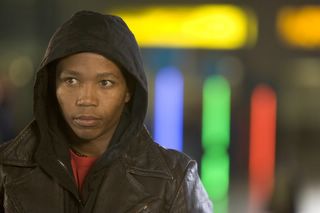Tsotsi
2006 Oscar winner for Best Foreign-Language film, South Africa's Tsotsi has repeatedly been compared to the masterful Brazilian epic City of God. I could not explain this comparison to you with any sort of clarity. They both take place in slums Third World nations. They are both shot in a fevered, gritty yet colorful style accented by the occasional use of handheld cameras. Umm...Okay, that's it.
Whereas City of God mashes together a spastic crime thriller and a lesson in the History of the Rio Slums, Tsotsi simply places a familiar, Western, sentimental narrative in a lively, well-sketched South African setting. With a few changes, the film could just as easily take place in South Philly or the South Side of Chicago as South Africa.
Perhaps I'm being unfair. Tsotsi has a strong sense of place. The soundtrack overflows with percussive local music, the dialogue melds together a variety of dialects (including Zulu, Afrikaans and English) and the nation's horrific AIDS crisis quiety provokes nearly all the on-screen action in subtle or unspoken ways.
At its best, the film provides a relatively clear, humane and recognizable portrait of how one cyclically impoverished, forgotten neighborhood functions. It's just that writer/director Gavin Hood (adapting a novel by Athol Fugard) falls back too frequently on genre conventions or maudlin manipulation to move along the regrettably familiar storyline. Surely there's some more captivating or telling story out there about the slums of Johannesburg, without falling back on the old "criminal finds a baby" routine.
Alas, that's the long and the short of Tsotsi, which strictly in terms of narrative has more to do with Three Men and a Baby or...ugh...Father Hood than the audacious City of God. The titular nickname, local slang for "thug," belongs to the film's hero (the soft-spoken and effective Presley Chweneyagae) and sums up his character fairly well. In the opening, we see him and his gang rob a man in the subweay, stabbing him in the process. While celebrating the score over drinks, he gets into an argument with friend Boston (Mothusi Magano) and nearly beats the poor guy to death. Running away from the bar, he steals a woman's car and shoots her in the gut, only to discover her infant son sitting in the back seat.
And I think that's about all I need to tell you about the story. Do you think maybe finding this child will have some kind of effect on Tsotsi's outlook? Might it cause him to reconsider the horrors of his own childhood and how they have affected his personality and behavior? When done really well, a quaint formula like this can still inspire an audience. It is possible. But Hood's film is just too simple and straight-forward, the lessons learned excessively easy and obvious.
In the film's best scene, Tsotsi takes his new youthful charge to see a pile of hollow concrete tubes in a field overlooking Downtown Johannesburg. This is the place where he grew up, a homeless child forming a makeshift community with other abandoned kids. Now, other children live there. The sequence makes this sort of endless suffering tactile, really palpable. In an odd way, it closely approximates a familiar scene from American films, including Annie Hall - the return to the childhood home. Here, the idea has been perverted - a hopelessly impoverished young man inspecting the hovel in which he once squatted, passing on some kind of knowledge or experience to another generation of abandoned kids.
I wanted much, much more of that and less changing poopy diapers. I've seen the "hard man has to change gross poopy diapers" thing a million times. Anybody remember Three Fugitives? Thankfully, there isn't a shot of Tsotsi getting hit in the face by stray wee-wee, but there might as well be. And it's not just what Chili Palmer would call the "three guys find a baby and then they start acting like three grown-up assholes" genre material that feels perfunctory. A subplot in which Tsotsi first threatens and then bonds with a single mother (Nambitha Mpumlwana) takes up a lot of time and goes nowhere.
Even the argument with Boston, the conflict that initiates all of the film's action, begins over nothing and is resolved easily through a single conversation. Local color will get you pretty far in this kind of film, which is as much about giving your audience a distinct and immersive sense of place as it is about a powerhouse narrative. But all the authenticity and earnestness Gavin Hood can muster doesn't overcome the faint stink of by-the-numbers predictability hanging over Tsotsi, a familiar narrative skulking around in a strange and unfamiliar world.

1 comment:
Hi, would like to invite you to visit my blog at cuckooscall.blogspot.com Thanks, rama, Calcutta
Post a Comment